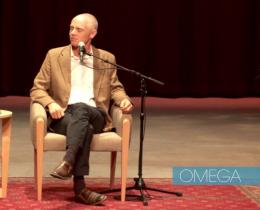Omega: In your book, The Unbelievable Happiness of What Is, you write that one of the biggest impediments on the spiritual path is our unexamined beliefs about life. How can we begin to uncover these beliefs?
Jon: When we go into silence and we actually begin to notice what we’re thinking and what we’re feeling, we begin to have the ability to inquire and also have an insight into our condition that we might not normally have. Most of us are not conscious of the beliefs that we're operating under. That's pretty standard. We just operate. So in essence, we’re very habitual creatures.
We want comfort and security. That’s our nature. It’s our condition. So developing consciousness, which is really what my work is all about, gives us an access to conscious awareness of what’s normally unconscious.
You could look, for instance, at a reaction that you might have to something. You hear something on the news, somebody says something to you, you get triggered and you immediately react and you say whatever, feel whatever, and think whatever.
You can reverse engineer that and go back and ask, “What is it that I must believe in order to have that reaction?” This is very much like Byron Katie's work. We ask, "What must be true and where is this coming from?"
We begin to look at how we think and we begin to see that freedom is really the separation between belief or identification and direct experience and reality.
Belief and identity aren’t separate. Belief is just a way to describe how we create the construct of a separate ego-self, which is just part of human nature. Nothing wrong with it. We have many identities. We have many beliefs. Many people have multiple conflicting realities within themselves.
Sometimes they try to get them all dovetailed or they reject a bunch of them and say, “Well this is who really am.” They reject those parts of themselves that they are afraid of.
A lot of the work from my perspective is getting all the chickens to come home to roost. You have to reclaim all your chickens. You have to reclaim all the parts of yourself and be able to see what it really is, which is that is not who you really are.
The beauty of this work is that we become whole. Whatever beliefs you have, even if you don’t know what they are, you'll begin to find out what they are.
You can have profound paradigm shifts. Often when people have an awakening or have a spiritual experience, they have profound paradigm shifts in how they see the world.
Omega: You once said, “Hope is a thought about a thought called the future. Yet, it’s our deep longing to come home.” Why is hope so important for the human condition?
Jon: It’s a part of our human need. It’s just very human. I think it’s important to allow that deep instinct to function and, at the same time, not have it interfere with our deeper path. You don’t want to confuse human development and a full expression with how the spiritual path unfolds. A lot of times, there’s this rejection of the human in order to be spiritual—that's the traditional approach that says "I am not the body," or "I am not the mind."
It’s very common that one has a deep shift in realizing there's nothing more important than service and nothing more important than realizing that we’re all in this together.
I absolutely have hope for humanity. I know there's plenty to be negative about. Plenty. You can overwhelm yourself very quickly with it all. You can take different perspectives, for sure. But I wouldn't be teaching and doing what I'm doing if I didn’t have hope.



